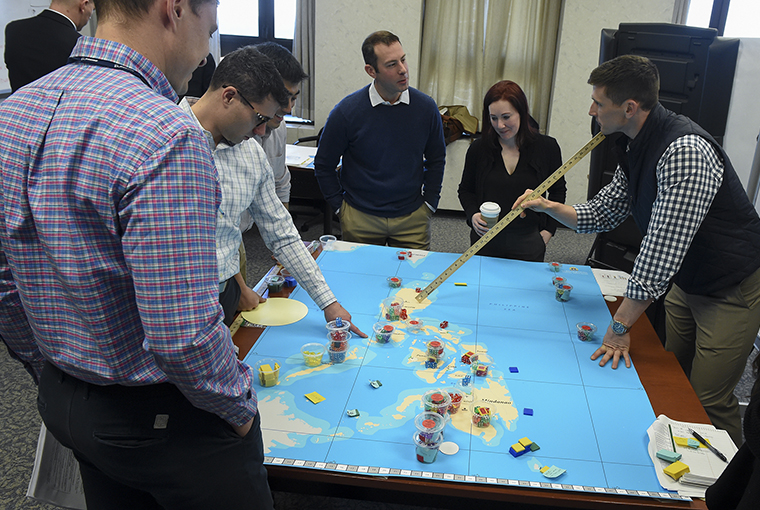Naval War College students participate in WWII-themed learning game beta test

NEWPORT, R.I. – U.S. Naval War College (NWC) students participated in a learning game beta test ran by NWC’s Joint Military Operations (JMO) and Wargaming departments. The students who participated were from two JMO seminars.
The premise of the learning game beta test was based on the Battle of Leyte Gulf during World War II.
The game was developed by Larry Johnson, a member of NWC’s Wargaming department and two NWC JMO professors, Marine Corps Lt. Col. Timothy Powledge and Cmdr. Nick Kristoff.
“The idea for the game was a direct result of professor Nick Murray’s wargame elective class in which I was a student last year,” said Powledge. “During professor Murray’s elective, the educational value of wargaming became apparent and I was inspired to design a game for the JMO department based on that experience.”
Phil Haun, NWC’s dean of academics, weighed in on the importance of taking electives while also focusing on the core curriculum.
“Lt. Col. Powledge, who is now on the JMO faculty, was a NWC student last year and took professor Nick Murray’s elective on war gaming,” added Haun. “He then spent the year applying the game to the JMO’s tabletop exercise as the students placed themselves in the position of the U.S. and Japanese military leadership a Leyte Gulf in the second World War. The game is a great example of how the elective program can make a contribution to the core curriculum.”
“This game provided students with a chance to play as two teams in each of the two seminars, facing off as U.S. and Japanese commanders in the culminating naval battle of Leyte Gulf which took place during World War II,” said Johnson. “The goal of the game was to provide an opportunity for experiential learning regarding the fundamental concepts of operational art supporting operational warfare.”
The game was setup to be a two-sided, closed-intelligence or “two-room” game, where neither side could see the other’s battle force line up and must determine through the course of play where and what the opposing side was executing with its forces.
During the game, the students maneuvered air, sea and land forces against each other in accordance with an operational idea that they generated based on their studies of the historical battle. The other reason behind the learning game beta test is to see if JMO will include this in the curriculum for all NWC intermediate course students next year.
Johnson explained how in one game, the Japanese team was able to flank the center of the U.S. effort and gain a significant position at the end of the game and was set to possibly disrupt the U.S. team's ability to complete their main objective.
“The other game saw lessons learned about timing and sequencing of tactical efforts in support of operational outcomes, while the Japanese team struggled with how to blunt U.S. air defense capabilities in order to create a gap to exploit,” continued Johnson. “Overall, I believe all the students gained a greater appreciation for maritime operations at the fleet level and how the maritime environment creates some unique challenges regarding getting the right stuff to the right place at the right time while balancing risk and reward.
“The response from the students was positive. Especially when they were winning, and even when they had bad outcomes from the decisions they made. They seemed to enjoy having ownership of their own destiny and being given a chance to apply themselves.”
